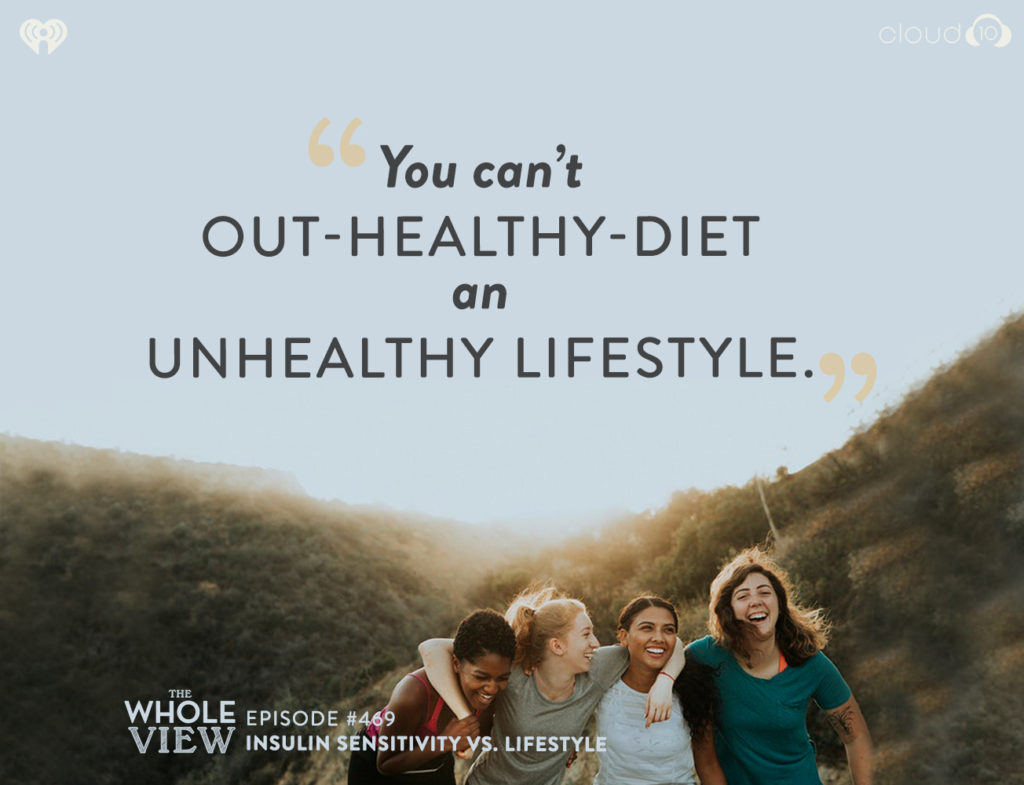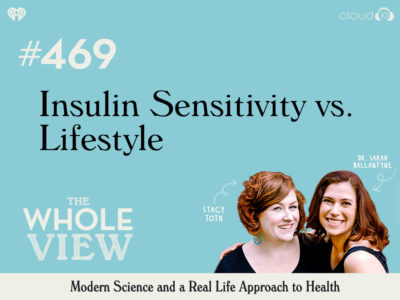There’s a ton of science showing extremely strong links between lifestyle factors (sleep, stress and activity) and insulin sensitivity and blood sugar regulation — sleep especially has a bigger impact than diet! Yet, the diet culture and medical establishment tendency is to blame people with insulin resistance and type 2 diabetes, relying on an overly simplistic model of insulin resistance caused by too-high sugar intake.
Table of Contents[Hide][Show]
So, this week on The Whole View podcast, Stacy and I dive into the studies that explain exactly how sedentary lifestyle, chronic stress, and inadequate sleep reduce insulin sensitivity. We also discuss the various ways lifestyle and diet are linked. For example, not getting enough sleep reduces insulin sensitivity and increases cortisol which further reduces insulin sensitivity, and both inadequate sleep and chronic stress increase appetite and cravings so we’re more likely to reach for sugary foods at the same time that we’re more insulin resistant — yes, it’s a snowball of badness effect. We also sprinkle in lots of tips to start making lifestyle improvements, with the goal of reducing insulin resistance (and ditching the guilt!)!
If you enjoy the show, please review it on iTunes!
Recommended Reading and Listening
- TPV Podcast, Episode 305: Why Insulin Is Important & Awesome!
- TPV Podcast, Episode 320: Can a Paleo or AIP Lifestyle Manage Diabetes?
- The Case for More Carbs: Insulin’s NonMetabolic Roles in the Human Body
- 3 Ways to Regulate Insulin that Have Nothing to Do With Food
- Healthy Weight Loss with Paleo, Part 2: Lifestyle Choices That Make a Difference
Citations
Cerf ME. Beta cell dysfunction and insulin resistance. Front Endocrinol (Lausanne). 2013 Mar 27;4:37. doi: 10.3389/fendo.2013.00037. PMID: 23542897; PMCID: PMC3608918.
Arciero PJ, Smith DL, Calles-Escandon J. Effects of short-term inactivity on glucose tolerance, energy expenditure, and blood flow in trained subjects. J Appl Physiol (1985). 1998 Apr;84(4):1365-73. doi: 10.1152/jappl.1998.84.4.1365. PMID: 9516205.
Hamburg NM, McMackin CJ, Huang AL, Shenouda SM, Widlansky ME, Schulz E, Gokce N, Ruderman NB, Keaney JF Jr, Vita JA. Physical inactivity rapidly induces insulin resistance and microvascular dysfunction in healthy volunteers. Arterioscler Thromb Vasc Biol. 2007 Dec;27(12):2650-6. doi: 10.1161/ATVBAHA.107.153288. Epub 2007 Oct 11. PMID: 17932315; PMCID: PMC2596308.
Gao R, Duff W, Chizen D, Zello GA, Chilibeck PD. The Effect of a Low Glycemic Index Pulse-Based Diet on Insulin Sensitivity, Insulin Resistance, Bone Resorption and Cardiovascular Risk Factors during Bed Rest. Nutrients. 2019 Aug 27;11(9):2012. doi: 10.3390/nu11092012. PMID: 31461862; PMCID: PMC6770095.
Dunstan DW, Kingwell BA, Larsen R, Healy GN, Cerin E, Hamilton MT, Shaw JE, Bertovic DA, Zimmet PZ, Salmon J, Owen N. Breaking up prolonged sitting reduces postprandial glucose and insulin responses. Diabetes Care. 2012 May;35(5):976-83. doi: 10.2337/dc11-1931. Epub 2012 Feb 28. PMID: 22374636; PMCID: PMC3329818.
Rosmond R. Stress induced disturbances of the HPA axis: a pathway to Type 2 diabetes? Med Sci Monit. 2003 Feb;9(2):RA35-9. PMID: 12601304.
Lambillotte C, Gilon P, Henquin JC. Direct glucocorticoid inhibition of insulin secretion. An in vitro study of dexamethasone effects in mouse islets. J Clin Invest. 1997 Feb 1;99(3):414-23. doi: 10.1172/JCI119175. PMID: 9022074; PMCID: PMC507814.
Save 70% Off the AIP Lecture Series!
Learn everything you need to know about the Autoimmune Protocol to regain your health!
I am loving this AIP course and all the information I am receiving. The amount of work you have put into this is amazing and greatly, GREATLY, appreciated. Thank you so much. Taking this course gives me the knowledge I need to understand why my body is doing what it is doing and reinforces my determination to continue along this dietary path to heal it. Invaluable!
Carmen Maier

Golovatscka V, Ennes H, Mayer EA, Bradesi S. Chronic stress-induced changes in pro-inflammatory cytokines and spinal glia markers in the rat: a time course study. Neuroimmunomodulation. 2012;19(6):367-76. doi: 10.1159/000342092. Epub 2012 Oct 6. PMID: 23051934; PMCID: PMC3535433.
Li L, Li X, Zhou W, Messina JL. Acute psychological stress results in the rapid development of insulin resistance. J Endocrinol. 2013 Apr 15;217(2):175-84. doi: 10.1530/JOE-12-0559. PMID: 23444388; PMCID: PMC3804337.
Tamashiro KL, et al., Chronic stress, metabolism, and metabolic syndrome. Stress. 2011;14:468–474
Van Raalte DH, et al., 2009 Novel insights into glucocorticoid-mediated diabetogenic effects: towards the expansion of therapeutic options? Eur J Clin Invest 39:81–93
Chaput JP, et al. “Sleep duration as a risk factor for the development of type 2 diabetes or impaired glucose tolerance: analyses of the Quebec Family Study.” Sleep Med. 2009 Sep;10(8):919-24. doi: 10.1016/j.sleep.2008.09.016. Epub 2009 Mar 29.
Gangwisch JE, et al. “Sleep duration as a risk factor for diabetes incidence in a large U.S. sample.” Sleep. 2007 Dec;30(12):1667-73.
Yaggi HK, et al. “Sleep duration as a risk factor for the development of type 2 diabetes.” Diabetes Care. 2006 Mar;29(3):657-61.
Bosy-Westphal A, Hinrichs S, Jauch-Chara K, Hitze B, Later W, Wilms B, Settler U, Peters A, Kiosz D, Muller MJ. Influence of partial sleep deprivation on energy balance and insulin sensitivity in healthy women. Obes Facts. 2008;1(5):266-73. doi: 10.1159/000158874. Epub 2008 Oct 23. PMID: 20054188; PMCID: PMC6515888.
Broussard JL, Ehrmann DA, Van Cauter E, Tasali E, Brady MJ. Impaired insulin signaling in human adipocytes after experimental sleep restriction: a randomized, crossover study. Ann Intern Med. 2012 Oct 16;157(8):549-57. doi: 10.7326/0003-4819-157-8-201210160-00005. PMID: 23070488; PMCID: PMC4435718.
Donga E, van Dijk M, van Dijk JG, Biermasz NR, Lammers GJ, van Kralingen KW, Corssmit EP, Romijn JA. A single night of partial sleep deprivation induces insulin resistance in multiple metabolic pathways in healthy subjects. J Clin Endocrinol Metab. 2010 Jun;95(6):2963-8. doi: 10.1210/jc.2009-2430. Epub 2010 Apr 6. PMID: 20371664.
Brouwer A, Asare Bediako I, Paszkiewicz RL, Kolka CM, Bergman RN, Broussard JL. Impact of sleep deprivation and high-fat feeding on insulin sensitivity and beta cell function in dogs. Diabetologia. 2020 Apr;63(4):875-884. doi: 10.1007/s00125-019-05084-5. Epub 2020 Feb 4. PMID: 32016566; PMCID: PMC7304935.
Arora T, Chen MZ, Cooper AR, Andrews RC, Taheri S. The Impact of Sleep Debt on Excess Adiposity and Insulin Sensitivity in Patients with Early Type 2 Diabetes Mellitus. J Clin Sleep Med. 2016 May 15;12(5):673-80. doi: 10.5664/jcsm.5792. PMID: 26943711; PMCID: PMC4865553.
Taylor BJ, Matthews KA, Hasler BP, Roecklein KA, Kline CE, Buysse DJ, Kravitz HM, Tiani AG, Harlow SD, Hall MH. Bedtime Variability and Metabolic Health in Midlife Women: The SWAN Sleep Study. Sleep. 2016 Feb 1;39(2):457-65. doi: 10.5665/sleep.5464. PMID: 27091639; PMCID: PMC4712396.
Rao MN, Neylan TC, Grunfeld C, Mulligan K, Schambelan M, Schwarz JM. Subchronic sleep restriction causes tissue-specific insulin resistance. J Clin Endocrinol Metab. 2015 Apr;100(4):1664-71. doi: 10.1210/jc.2014-3911. Epub 2015 Feb 6. PMID: 25658017; PMCID: PMC4399283.










